Bob Reed here. I am almost done with my third of four course sessions at the Center for Justice and Peace Summer Peacebuilding Institute (SPI). The content in these courses, coupled with the out-of-class experiences with peacebuilders from all over the world, has been a learning experience beyond the power of words to express. Everyday brings new gifts, new understanding, new delights. It is a remarkable privilege to be in the company of heroes and prophets from all over the world spending themselves for peace and justice. We are students from Palestine, Israel, Syria, Iraq, Sri Lanka, India, Pakistan, Egypt, Northern Ireland, Rwanda, South Africa, Lesotho, Nepal, Colombia, Sudan, and dozens of other countries. We are Muslim, Jewish, Christian, Buddhist, atheist, agnostic, and even an Coptic monk. SPI has been perfect training for me as I ready myself for Liberia. Let me tell you a bit about the classes:
Session I-- Introduction to Conflict Transformation
Really, the course material was paradigm shattering. The entire conflict transformation approach was at once revelatory and novel, yet at the same time familiar and easy to embrace. It is not so much about technique or modality as it is a philosophy of being. I'd call it elegant if it were not for all the horror and chaos it lives in. The course normalized the concept of conflict and introduced me to a way of framing conflict, identifying underlying issues, and working with the principals to transform conflict into something new and better than what existed before. The instructor, David Hooker facilitated with grace, humor, and poise that can only come from doing this stuff in some of the toughest venues in the world.
Session II-- Designing Learner-Centered Training for Conflict Transformation
Just when I thought David Hooker could not be topped, I met Robb Davis. Completely different that David, Robb is another world-class instructor. The course content is the "dialogue education" approach from Jane Vella, founder of Global Learning Partners. I did not realize how much I could learn about teaching, but this was beyond all expectations. Dialogue education allows an abstract and intuitive guy like me to identify and organize the specifics of what I know. It will lay a path for me to do analysis to serve Liberians according to how they frame their needs, using resources they bring to the table. The approach will enable me to clearly articulate what I want students and trainees to do with the very specific content they are looking to learn. I have not worked as hard as I worked in this class in the last twenty years.
Session III-- Trauma and trauma Healing
Another important and relevant class. What it has most powerfully offered me is an articulation of what I have been thinking recently, namely that trauma, especially in contexts where entire societies have been traumatized, is simply outside the scope of traditional talk therapy to provide adequate healing. Because trauma is a whole mind, body and spirit experience, it is often completely beyond words to describe or recount. Symbolic language is often the most satisfying way a group or individual in deep trauma address and communicate the meaning of the events. I am receiving a steady stream of techniques and approaches to use: Mandalas, theatre, Haiku, human sculpting, symbolizing, memorializing. I'm also becoming acquainted with the language of restorative justice, which looks to forgiveness, restitution and relationship healing instead of retribution, blaming and punishment.
Session IV-- Peacebuilding for Traumatized Societies
Taught by Barry Hart, a man who has worked in Liberia, this course promises to be the perfect capstone to a remarkable training. It does not begin for another week, but already I am looking forward to it. Everyone I've talked to says its an outstanding course.
Each of these courses brought something new and unique to my training. Conflict Transformation, Curriculum Development, Trauma Healing, and Peacebuilding in a Traumatized Society-- these are exactly what I need for what I'll be doing, and I could not more pleased. Add to that the out-of-class relationships, and this place is indescribably rich and delightful. If in-class nourishes the mind and spirit, out of class feeds the heart and soul.
I wish you all could share this experiment in international peacebuilding.
Sunday, June 05, 2005
Subscribe to:
Post Comments (Atom)


No comments:
Post a Comment